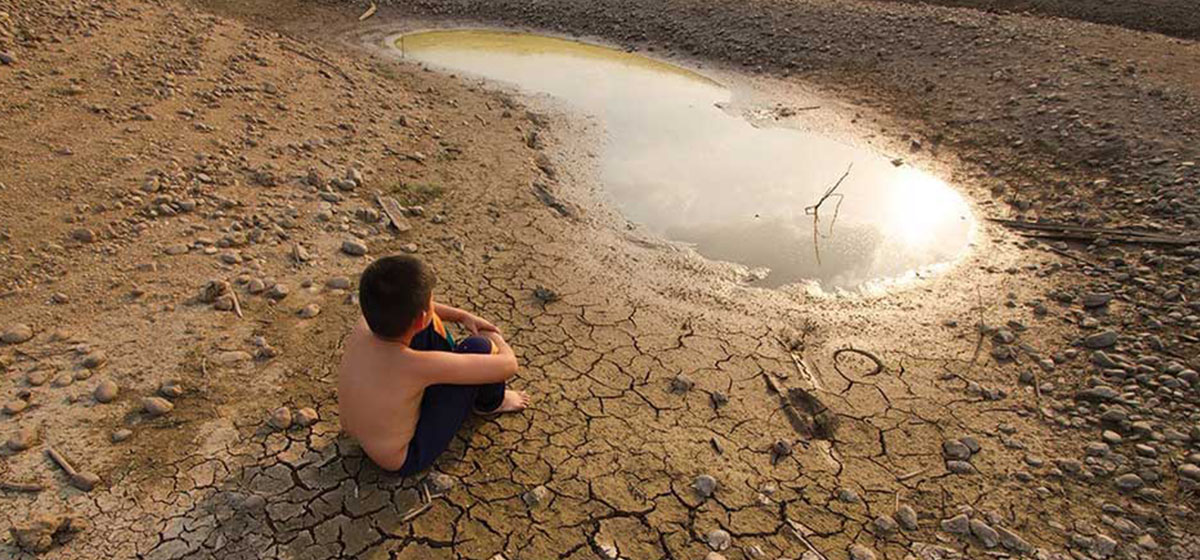
OR
Opinion
Protecting Health from Climate Change
Published On: September 25, 2021 06:30 AM NPT By: Dr Pallavi Koirala


Dr Pallavi Koirala
The author is a junior resident at College of Medical Sciences, Bharatpurkoiralapallu@gmail.com
Climate change affects the social and environmental determinants of health- clean air, safe drinking water, sufficient food and secure shelter. Diseases like respiratory and cardiovascular diseases, water–borne diseases, infectious diseases, mental health problems and premature death are the effects of climate change. There is strong evidence suggesting that climate change can affect health.
“Health is wealth”- The last year has revealed this quote like never before. COVID-19 reminded us of the direct relationship between our health and the environment that we live in. It has exposed the insufficiencies of the health system in the provision of primary health care and emergency services. It taught us the importance of establishing a strong health system that is sustainable and affordable to all .
Waves of COVID 19 hit the world so hard that no powerful weapons could stop the raining cases and deaths. Health workers all over the world fought like warriors on the battle ground and eventually the miraculous invention of the vaccine has definitely given us some hope now. However, we cannot avoid the fact that the risk of epidemics and pandemics has increased due to the uncontrolled urbanization, unplanned industrialization and climate change. The pandemic has provided a new lens to view the world, especially in terms of health.
Between 2030 and 2050, climate change is expected to cause approximately 250,000 deaths per year from malnutrition, malaria, diarrhoea and heat stress. Climate change affects humans in two ways: by changing the severity or frequency of health problems that are already affected by climate or weather factors and second by creating unprecedented or unanticipated health problems in places where they have not previously occurred. Some existing health threats will intensify and new threats will emerge.
Climate change affects the social and environmental determinants of health- clean air, safe drinking water, sufficient food and secure shelter. Diseases like respiratory and cardiovascular diseases, water–borne diseases, infectious diseases, mental health problems and premature death are the effects of climate change. There is strong evidence suggesting that climate change can affect health. Direct changes such as increased heat stress and loss of life in floods and storms and indirect changes through vector borne diseases (like malaria , dengue, Kala-azar, Japanese encephalitis) water borne pathogens (Typhoid, diarrhoea, dysentery, hepatitis) water and air quality and food quality. Emergence of new diseases and the risk factors are the major consequences of climate change.
The beautiful snow-capped mountains have been clad in stagnant smog in the past few days. The hazardous smog blanketing the entire Kathmandu valley has possessed a huge threat in terms of health. It increases the risk of non-communicable diseases like respiratory illnesses, heart diseases, cancers, burning of eyes etc. The smoke emitted by the factories, the increased level of vehicular emission, the cross border industrial pollution and the wildfires in different areas around the Valley have contributed to affecting the Air Quality Index (AQI) of the Valley. It is a real challenge to the entire ecosystem and urgent measures should be taken to curb pollution.
Being a landlocked country and due to its complex topography, Nepal is inclined to climate change and the environmental change in temperature and precipitation at a faster rate. Its low resilient capacity and lack of adequate funds for adaptation makes Nepal and its people vulnerable to climate change. Millions of Nepalis are at high risk from the effects of climate change including life threatening diseases and co-morbid conditions. Hence, it is imperative for Nepal to find the preventive measure for climate change simultaneously to achieve the Sustainable Development Goals.
Nepal’s Climate Change Policy (2011) in coordination with National Adaptation Programme in Action (NAPA) envisions “a country spared from the adverse effect of climate change.” Specific strategies include monitoring glacier lakes, forecasting and providing early warning information for water-induced disasters and addressing vector-borne, infectious and communicable diseases that are exacerbated by climate change.
The Ministry of Health and Population(MoHP) of Nepal prepared a Health National Adaptation Program (H-NAP) Climate Change Adaptation Strategies and Action Plans of Nepal (2017-2022) and is implementing it to address those issues. Health National Adaptation Plan (H-NAP): Climate Change and Adaptation Strategy And Action Plan (2016) aims to develop a national strategy on climate change with adequate focus on the health sector and intersectoral collaboration to protect health from adverse effects of climate change.
Nepal is taking baby steps in controlling the effects of climate change. The policies and strategies have not been prioritized for implementation yet. The health sector should focus on strategic policy making, its implementation and strengthen the entire sector to combat the negative health impact of climate change. Promotion of health education for the community by conducting different programmes to climate-sensitive diseases can be an effective adaptive measure to prevent further occurrence of the diseases. Empowerment of the communities to respond to climate change should be prioritized. Quarantine programs should be strengthened for the effective elimination and eradication of diseases.
Government should emphasize research and studies on vector dynamics and change patterns for all vector borne diseases. Early warning and surveillance systems should be intensified. Multisectoral collaboration should be the utmost priority in the prevention of health risk of climate change in Nepal. From people at the grass root level to the policy makers, everyone should be updated about climate change and its effects on health.
Since the climate is changing, it's high time we change our ways to contribute to reducing the effects. Simple and small acts like saving energy , avoiding plastic whenever we can, throwing garbage only in bins, planting trees, consumption of organic foods, and reducing water waste can help in huge ways. Healing of our planet starts from our home. Let's all play our roles !
French President Francois Hollande said “We can't handover a planet that is inhabitable to the next generation. It might seem improbable but it is our responsibility to preserve it for generations to come. We have a single mission: to protect and hand the planet to the next generation.”
(The author is a Junior Resident, Department of Community Medicine, College of Medical Sciences, Bharatpur.)
You May Like This

Climate Change Effect on Health
Between 2030 and 2050, climate change is expected to cause approximately 250 thousand deaths per year from malnutrition, malaria, diarrhea,... Read More...

Mugu's health post operating without health workers
MUGU, Jan 10: Absence of health workers at a local health post of western Khatyad Rural Municipality-10, Hyanglung of Mugu has... Read More...







Just In
- NRB to provide collateral-free loans to foreign employment seekers
- NEB to publish Grade 12 results next week
- Body handover begins; Relatives remain dissatisfied with insurance, compensation amount
- NC defers its plan to join Koshi govt
- NRB to review microfinance loan interest rate
- 134 dead in floods and landslides since onset of monsoon this year
- Mahakali Irrigation Project sees only 22 percent physical progress in 18 years
- Singapore now holds world's most powerful passport; Nepal stays at 98th











Leave A Comment